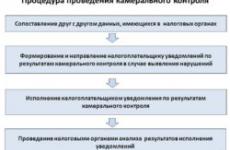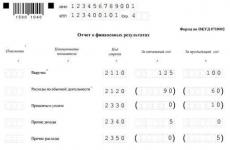How to learn about inspections in the enterprise. How to learn about the on-site check
Administrative checks are carried out by the sanitary epidemiological station, the Ministry of Emergency Situations, the labor inspectorate, municipal authorities, and so on. This can be either a document control or a field check.
According to Federal Law No. 294-ФЗ, an enterprise cannot be subject to administrative checks more often than once every 3 years.
The basis for the inspection is a plan that is drawn up by the controlling organizations and is approved by the Prosecutor General’s Office of the Russian Federation. Not later than 3 days before the start of control measures, the head of the enterprise should receive a copy of the order of the department that will come with the check. The order must indicate the purpose of the audit and its legal justification.
What can an inspector check?
Control measures and documents that may be required during the audit are reflected in the Administrative Regulations of the relevant regulatory organizations.
Sometimes the controlling organizations exceed their authority and require the submission of documents, product samples, environmental samples that are not subject to administrative verification. This is illegal. In addition, the inspector does not have the right to independently extend the inspection deadlines and require the enterprise to pay for control measures (Article 15 of the Federal Law No. 294).
Based on the results of the administrative inspection, the inspector can draw up a prescription to eliminate the violations found and set a deadline for the execution of this prescription. When this period expires, the inspectors will come in again. However, in this case, the powers of the inspectors are limited to controlling the elimination of previously detected violations. He has no right to hold other control measures.
What to do if your company is waiting for verification?
First of all, carefully study the Federal Law No. 294 and the Administrative Regulations of the state or municipal control body that will come to you with verification. These sources will allow you to understand what documents the inspector may require and what he will pay attention to.
Put in order the accounting and reporting documents, request the missing information from counterparties, bring the production facilities in accordance with the requirements of the agency that will inspect your company. Usually these requirements can be found on the websites of the relevant government agencies.
For example, on the website of the Ministry of Emergency Situations in the section “Useful” / “To help small businesses” there are fire safety rules for small and medium businesses, as well as specific characteristics that must be met by auto repair shops, hotels, hairdressers and other objects.
There may be a lot of requirements that must be met in order to successfully pass the test. And it is not always possible to satisfy them for the three days that are at the disposal of the company since the moment of the official notification of the check. The sensible way out is to find out in advance what checks are waiting for the company, since a consolidated inspection plan is approved for a year.
How to find out about checking in advance?
You can find out if your organization is facing an administrative review by using the Expert service from SKB Kontur.
Please note: the search for an organization in the list of scheduled checks is available not only to the paid users of the Expert and subscribers of the Kontur-Extern system, but also to everyone.
To find out which departments will come to you with a check, go to 2013.site and register with the service, select the "Find an organization in the list of scheduled checks" section, enter the TIN and the full name of the company.
Also, users of the paid version of the Expert service and subscribers of the Kontur-Extern system have access to the consolidated inspection plan.
POPULAR NEWS
 Invoice: the line "government contract identifier" can be left blank
Invoice: the line "government contract identifier" can be left blank
From 01.07.2017, a new line 8 “Identifier of the state contract, agreement (agreement)” appeared in the invoices. Naturally, you need to fill in this prop only if it is available. Otherwise, this line can simply be left blank.
 The penalty for the submission of VAT clarifications not in the prescribed form can be challenged
The penalty for the submission of VAT clarifications not in the prescribed form can be challenged
Taxpayers who are obliged to submit a VAT-declaration in electronic form, and an explanation to it in response to the demands of the tax authorities should be sent to TKS. There is an approved format for such electronic explanations. But as follows from the recent decision of the Federal Tax Service, even if the established format is neglected, there should be no penalty.
 Income tax: how to confirm the cost of an electronic ticket
Income tax: how to confirm the cost of an electronic ticket
If a ticket for a traveler was acquired in electronic form, a “boarding pass” with a note of inspection is required, among other things, to confirm “travel” expenses for “profitable” purposes. And what to do, if at a foreign airport such marks are not accepted?
 Tax authorities and funds agreed to adjust the balance of contributions on 01/01/2017
Tax authorities and funds agreed to adjust the balance of contributions on 01/01/2017
The procedure for the transfer of authority to administer contributions from the funds to the tax authorities did not go as smoothly as planned. Many insurers are faced with the fact that inspections require to pay arrears on contributions that exist only on paper. And finally, the FTS, the FSS and the FIU have developed a mechanism for clarifying incorrect data.
 Determining the amount of “child” deductions will no longer cause difficulties.
Determining the amount of “child” deductions will no longer cause difficulties.
Most often, employees turn to the employer for a personal income tax deduction for children. And well, if the employee has only one child. And if, for example, four of them and two of them are already adults, then the accountant may have a question about the size of the “child’s” deduction. Our new will come to the rescue in a similar situation.
How to learn about the on-site check
The field test will start from the day indicated in the decision on its appointment. From this date, the total time allotted for the test will be counted. clause 8 of Art. 89 NK RF.
Field Verification Notification
The NC does not say that the inspectorate should warn you in advance about the upcoming on-site inspection. Letter of the Federal Tax Service dated November 18, 2010 No. АС-37-2 / 15853. Although they usually do it in their own interests, in order to avoid unpleasant surprises such as a company chief-book leave or an entrepreneur's departure. Indeed, as we have said, the period for conducting an audit is considered from the date of the decision clause 8 of Art. 89 NK RF.
There is no point in asking tax officials to postpone the check to a period convenient for you due to the fact that you do not have time to give them proper attention, for example, if the accounting department prepares annual reports. Meet you in the IFTS will not go. And it’s useless to waste time challenging this in court, he will be on the side of tax Resolution of the Federal Antimonopoly Service of Higher Military Training of June 29, 2011 No. A79-10188 / 2010.
Inspection of the verification decision
With the decision to conduct a field audit (on amending it), the tax authorities are obliged to inform you. About how they should do this, the NK does not say. The FTS permits the use of various methods Letters of the Federal Tax Service dated July 25, 2013 No. АС-4-2 / 13622 (clause 1.2), dated July 17, 2013 No. АС-4-2 / 12837 (clause 2.2), dated September 13, 2012 No. АС-4-2 / [email protected] (question 9).
METHOD 1. Inspectors will come to you themselves and immediately submit a decision to conduct an inspection along with their official IDs. In the decision, the head of the organization (its representative by attorney and clause 1, Article. 26, para. 1, Art. 27, paragraph 1 of Art. 29 of the Tax Code) or IP must sign.
METHOD 2. The head of the organization / IP will be summoned to the Federal Tax Service Inspectorate and handed him a copy of the decision to conduct the inspection, and they will be asked to sign on their copy, saying that they are familiar with the decision sign 4 p. 1 Art. 31 NK RF. To do this, you will be sent a notification of the call on the form approved by the FTS appendix No. 2 to the Order of the Federal Tax Service of 08.05.2015 No. MMB-7-2 / [email protected] . In it the tax inspectorate will indicate:
- purpose of calling a representative of the organization / SP Letter of the Federal Tax Service of 09.10.2015 No. ED-4-2 / 17621 (p. 1);
- date and time when it is necessary to come (or a period of time and visiting hours);
- the address of the Federal Tax Service Inspectorate and the office number where you need to appear.
This inspection notice may convey to you as appropriate. sign 4 p. 1, p. 4, Art. 31 NK RF:
- deliver to the representative of the organization / PI personally;
- send by registered mail;
- send electronically by TKS. In this case, you must, within 6 business days, send a receipt on receipt of the notification to the IFTS via TCS clause 5.1 of Art. 23 NK RF. If you do not do this, the inspectorate may block your bank account. sign 2 p. 3 Art. 76 NK RF.
Instead of the head of the organization at the appointed time in the Inspection of the Federal Tax Service can come and a representative of the organization by proxy and
The tax inspectorate physically can not check all taxpayers to one, so she is forced to carry out inspections selectively. For the selection of the "lucky ones" a plan of field tax audits (GNP) is drawn up. It is prepared on the basis of a pre-audit analysis of the taxpayer’s activities and is approved by the Federal Tax Service Administration.
Note. It is believed that the tax authorities may come with so-called unscheduled inspections. This is not entirely true. Unscheduled inspections are not provided for by the existing mechanism for planning and preparation of field tax audits.<1> . However, for various reasons, for example, in case of negative information about your company from legal entities or individuals or from law enforcement agencies, tax authorities may make changes to the inspection plan and include your company in it.
Tax legislation does not establish a procedure for selecting taxpayers for on-site inspections. Therefore, the tax authorities develop it independently. In 2007, the FTS of Russia approved the Concept of a system for planning field tax audits (hereinafter referred to as the Concept) and Generally Available Criteria for Independent Risk Assessment for Taxpayers<2> . If the taxpayer falls into the risk zone, that is, meets the risk assessment criteria, the probability is high that it will be included in the inspection plan.<3> .
Both the Concept and Publicly available risk assessment criteria are publicly available. However, self-performed risk assessment calculations may not always coincide with the tax authorities' calculations.<4> . In addition, they are guided not only by the specified criteria. And, for example, they also use information received from law enforcement agencies or contained in citizens' appeals, taking into account the results of the desk audits.
How do you know if you are in the inspection plan or not?
Online accounting forums answer this question in different ways. Someone declares that soon the tax authorities will be obliged to acquaint taxpayers with a plan of inspections in advance. Someone says that the inspection plan is publicly available on the FTS website. But these are false rumors.
In reality, the tax plan is a GNP plan exclusively for personal use. You cannot legally find out whether or not you are included in it: the plan is a confidential document. Even for the employees themselves, access to the information contained in the plan is limited and strictly regulated. And there is no obligation to inform you of the intention to conduct a GNP.<5> .
In fact, you’ll know that you’ll have an on-site check, only after they call you and invite you to get acquainted with the decision to make a GNP or when the tax authorities call you at the door and tell you that they’ve already come for a check.<6> .
As a rule, most accountants are aware of tax intentions in advance. And GNP rarely comes as a complete surprise. Sometimes the tax authorities themselves report on their plans. For example, for you to start preparing documents in advance. Or your suppliers (buyers) can inform you that they, among others, are asked for documents regarding your transactions with them.<7> . This can be a signal, since at the pretesting analysis stage, the tax authorities investigate all your connections for the presence of tax evasion schemes in them.
___________________________
<1> Letter of the Federal Tax Service of 23.01.2009 N ShS-21-3 / 40
<2> Order of the Federal Tax Service of 30.05.2007 N MM-3-06 / [email protected]
<3> Letter of the Federal Tax Service of July 31, 2007 No. 06-1-04 / 505
<4> section 4 Concepts
<5> Letters of the Federal Tax Service of 18.11.2010 N AS-37-2 / 15853, of 04.04.2008 N SHT-6-2 / [email protected]; Resolution 2 AAS of 09/06/2011 N A28-2594 / 2011
Tax checks are cameral and field. Cameral are held immediately after filing a tax return and last for three months. With on-site inspections, the situation is much more complicated: a comprehensive analysis of the activities of taxpayers is carried out and on the basis of it a plan for on-site tax audits is drawn up, which is approved by the Federal Tax Service Administration.
Contrary to popular belief, there is no way to know in advance whether your company got into the site inspection plan or not. But you can try to independently assess the risks. In this article we will talk about how to find out when to expect a tax audit.
For the selection of applicants for inspection, the Federal Tax Service has developed and approved a Concept for planning field tax audits (Order of the Federal Tax Service of Russia of 30.05.2007 No. MM-3-06 / [email protected]). It presents 12 criteria for assessing taxpayers. Let us examine some of them in more detail - this will help to understand when to wait for the tax audit:
- The tax burden is below the industry average. Tax burden is the ratio of taxes paid and revenues. The calculation of the tax burden for the main activities is in Appendix No. 3 to the Concept. If your company has this figure lower, the risk of verification increases. Be prepared to give a business case for this fact.
- Losses in tax or financial statements over two or more tax periods. If you have just started your business, there will most likely not be a check on losses. If you have been working for more than one year, the tax authorities may be interested in the situation. It is better to prepare in advance documents explaining why your company is not making a profit.
- The share of VAT deductions is greater than or equal to 89% for 12 months. To explain this fact you may be called to the VAT-commission. If you give a detailed justification for the excess of the bar, you will be able to avoid a tax audit, otherwise the tax authorities are more likely to conduct an additional audit.
- The growth rate of expenses outpaces the increase in revenue. In this case, the inspectors pay attention to the income tax, which can specifically reduce by overstating costs.
- The average salary is below the industry average for your region. This may be a signal of the presence of "gray" or "black" salaries in the company. Checks can be avoided by presenting documents to the inspectors explaining why the company has low salaries.
- The value of indicators has repeatedly approached the limit values established by the Tax Code of the Russian Federation, at which the taxpayer is entitled to use special tax regimes. This may push the tax authorities to the idea that the financial results of the activity are undervalued in order to stay within the framework of a special tax regime.
- The costs are as close as possible to the amount of income received for the calendar year. The share of professional tax deductions (Article 221 of the Tax Code of the Russian Federation) in the total amount of income should not exceed 83%. Out of every 100 rubles, taxes must be taxed at least 17.
- Work with intermediaries without a reasonable economic goal, that is, just to get tax benefits. If you systematically involve intermediaries in your work, the tax inspectorate will definitely pay attention to you, but will only check it when combined with other circumstances, for example, if there are so-called one-day firms among your intermediaries.
- The level of profitability differs by more than 10% from the industry average.
- Ignoring the requirements of the tax inspection. When the tax audit (cameral) revealed any inaccuracies in the documents, the IFSN sends you a notice of the provision of additional information. Do not ignore the requirements and submit the specified documents on time - otherwise they may order a field check.
- High tax risks.
How to find out when there will be a check?
If your company meets at least one of the above criteria, it makes sense to be prepared for a tax audit: put in order the documents, check the correctness of the accounting. This can be done by the staff of the accounting department or order a verification of the accounting of a third-party company.
For example, the service "Validation of accounting" offers our accounting company "Taxon". An advance verification of bookkeeping minimizes the risks of fines and additional charges after verification.






